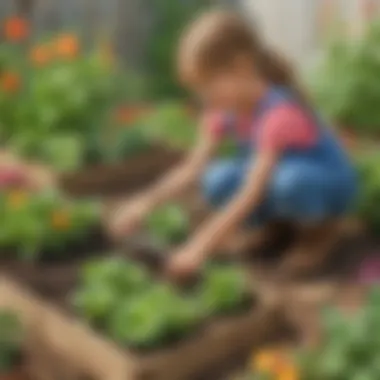Engaging Health, Safety, and Nutrition Lesson Plans for Preschoolers: A Comprehensive Guide


- Tips and Tricks
When it comes to enhancing children's learning journey, practical tips play a crucial role for parents and educators. Implementing strategies to make learning fun and engaging can significantly impact a child's educational experience. By incorporating innovative and interactive techniques, adults can create a stimulating environment that fosters curiosity and knowledge acquisition.
This section delves into various practical tips that cater to parents and educators aiming to optimize the learning endeavors of preschoolers. From establishing structured routines to incorporating hands-on activities, these suggestions are designed to provide a holistic approach to education.
Strategies for Making Learning Fun and Engaging
One key aspect of facilitating effective learning for preschoolers is to make the process enjoyable. By integrating elements of play and exploration, educators can capture children's interest and motivate them to actively participate in educational tasks. Engaging lessons that involve movement, creative expression, and interaction can enhance retention and comprehension.
Additionally, utilizing educational games and interactive technology can make learning more captivating and dynamic. By leveraging these tools, parents and educators can create a dynamic learning environment that encourages active participation and critical thinking skills development.
Introduction to Health, Safety, and Nutrition
In this article, we delve into the critical aspects of health, safety, and nutrition tailored specifically for preschoolers. As foundational elements in a child's development, focusing on these areas sets the stage for lifelong well-being. By instilling healthy habits early on, we can equip young children with essential skills and knowledge to lead healthy lives. Understanding the nuances of health, safety, and nutrition is key for educators, parents, and caregivers to provide comprehensive support to preschool-aged kids.
Understanding the Importance of Early Education
Setting the Foundation for Lifelong Health
Setting the foundation for lifelong health is paramount in promoting overall well-being in children. This involves introducing concepts like proper nutrition, hygiene practices, and safety protocols from a young age. By establishing these principles early on, we empower children to make informed decisions regarding their health as they grow. Incorporating activities that emphasize the importance of healthy living helps in creating a solid groundwork for children's future health.
Integrating Wellness Into Early Learning
Integrating wellness into early learning programs enriches the educational experience by addressing the holistic development of children. By fostering a positive attitude towards health and well-being, children are more likely to adopt healthy habits into their daily routines. This approach ensures that wellness becomes a fundamental part of their early education, laying the groundwork for a lifetime of making healthy choices.
Benefits of Teaching Health, Safety, and Nutrition at a Young Age
Building Healthy Habits From the Start


Teaching health, safety, and nutrition to preschoolers at a young age establishes a strong foundation for building lifelong healthy habits. By introducing nutritious food choices, promoting regular physical activity, and emphasizing the importance of personal hygiene, children learn the significance of taking care of their bodies. These early lessons instill behaviors that can positively impact their physical and mental well-being in the long run.
Preventing Accidents and Injuries
Educating young children about safety measures and accident prevention is crucial in mitigating potential risks. By teaching them about common household hazards, safe play practices, and emergency procedures, caregivers can create a secure environment for children to thrive in. Empowering children with knowledge about safety measures instills a sense of caution and responsibility, reducing the likelihood of accidents or injuries.
Nurturing a Positive Relationship With Food
Fostering a positive relationship with food from a young age is pivotal in shaping children's attitudes towards eating habits. By exposing them to a variety of nutritious foods, involving them in meal preparation, and encouraging mindful eating practices, caregivers can instill a healthy relationship with food. This approach helps in cultivating good eating habits early on, promoting a balanced diet and a positive outlook towards nutrition.
Designing Engaging Lesson Plans
Designing engaging lesson plans for preschoolers is a crucial aspect of early childhood education. These lesson plans serve as the foundation for instilling essential health, safety, and nutrition concepts in young minds. By creating dynamic and interactive activities, educators can capture the attention of preschoolers, making learning a fun and engaging experience. Considering the short attention spans of young children, incorporating various elements like hands-on experiments, role-playing scenarios, educational resources, and interactive tools is key to maintaining their interest and maximizing learning outcomes. The benefits of designing engaging lesson plans extend beyond just delivering information; they help cultivate a lifelong passion for health and well-being in preschoolers. When designing lesson plans, factors such as age-appropriate content, diverse learning styles, and measurable learning objectives must be carefully considered to ensure that each activity effectively contributes to the child's overall development.
Incorporating Interactive Activities
Hands-On Experiments and Demonstrations
Hands-on experiments and demonstrations play a pivotal role in reinforcing key health, safety, and nutrition concepts in preschoolers. These activities provide tangible experiences that allow children to explore principles through touch, sight, and sound. By actively engaging in experiments, preschoolers deepen their understanding of topics such as hygiene practices, food groups, and safety measures. The interactive nature of hands-on experiments not only makes learning enjoyable but also promotes retention of information. Additionally, hands-on activities enable educators to assess children's comprehension levels and tailor future lessons accordingly. While hands-on experiments offer numerous benefits, proper supervision and safety precautions are essential to ensure a secure learning environment for preschoolers.
Role-Playing Scenarios for Safety Practices
Role-playing scenarios are effective tools for teaching preschoolers essential safety practices in a practical and engaging manner. By simulating real-life situations such as fire drills, crossing the road safely, or responding to emergencies, children learn to apply safety rules in different contexts. Role-playing encourages active participation, critical thinking, and decision-making skills, allowing preschoolers to practice and internalize safety protocols effectively. Moreover, role-playing scenarios foster social interaction and collaboration among children, enhancing their communication and teamwork abilities. While role-playing activities enhance safety education, educators should create a supportive and non-judgmental atmosphere to encourage children's participation and creativity.
Utilizing Educational Resources
Interactive Apps and Digital Tools
Interactive apps and digital tools have emerged as valuable resources for enriching the learning experience of preschoolers. These tools offer interactive features, quizzes, and engaging content that make learning about health, safety, and nutrition enjoyable and stimulating. Interactive apps provide instant feedback, personalized learning pathways, and visual aids that cater to varying learning styles and preferences. By incorporating interactive apps into lesson plans, educators can enhance children's technological literacy and digital skills while reinforcing important educational concepts. However, it is essential to monitor screen time, select age-appropriate apps, and maintain a balance between digital and hands-on activities to maximize the benefits of these resources.
Storybooks and Visual Aids for Nutritional Learning


Storybooks and visual aids play a significant role in promoting nutritional education among preschoolers. Through colorful illustrations, engaging stories, and relatable characters, children can grasp complex nutritional concepts in a simplified and entertaining manner. Storybooks create opportunities for discussions, vocabulary building, and imaginative exploration of healthy eating habits. Visual aids like charts, posters, and food models enhance visual learning, memory retention, and connection to real-world applications. By incorporating storybooks and visual aids into nutrition lesson plans, educators can create a stimulating learning environment that nurtures a positive relationship with food and encourages healthy eating choices. However, educators should ensure the accuracy of nutritional information presented in storybooks and promote a balanced view of different food groups and dietary practices.
Promoting Healthy Habits
Promoting healthy habits is a fundamental aspect of the educational journey for preschoolers outlined in this article. By instilling positive behaviors early on, children can develop lifelong practices that contribute to their overall health and well-being. Focusing on elements such as good hygiene, physical activity, and nutritious eating, this section aims to lay the foundation for a healthy lifestyle from a young age.
Encouraging healthy habits in preschoolers not only sets the stage for their current well-being but also impacts their future trajectory. Building routines around hygiene practices, promoting physical activities, and introducing nutritious food choices can have long-lasting effects on children's growth and development. By emphasizing these aspects in early education, caregivers and educators play a vital role in shaping children's attitudes towards health and wellness.
Considerations about promoting healthy habits revolve around creating a supportive environment that nurtures positive behaviors. Implementing engaging activities, setting achievable goals, and modeling healthy practices are key strategies to promote lasting habits in preschoolers. By incorporating varied approaches tailored to each child's needs and preferences, educators and caregivers can effectively reinforce the importance of healthy lifestyle choices.
Hygiene Practices and Personal Care
Handwashing Techniques
Handwashing techniques play a crucial role in maintaining proper hygiene among preschoolers, contributing significantly to this article's emphasis on promoting healthy habits. The key characteristic of effective handwashing techniques lies in thoroughness and consistency. Ensuring that children understand the importance of washing hands properly and introducing them to age-appropriate techniques can significantly reduce the spread of germs and illnesses in educational settings.
One of the unique features of handwashing techniques is their simplicity yet undeniable impact on preventing the transmission of infectious diseases. By teaching children the proper steps and duration for handwashing, caregivers and educators can instill a vital lifelong habit that underpins their overall health and well-being.
Dental Care Tips for Kids
Dental care tips for kids are another essential component of personal care highlighted in this article. Maintaining good oral hygiene plays a significant role in children's overall health, emphasizing the importance of regular brushing, flossing, and dental check-ups. The key characteristic of effective dental care tips lies in establishing consistent routines and promoting positive attitudes towards oral health.
One of the unique features of dental care tips for kids is their emphasis on preventive measures to avoid dental issues such as cavities and gum disease. By educating children on proper brushing techniques, the importance of regular dental visits, and the impact of diet on oral health, caregivers and educators can empower them to take charge of their dental well-being.
Ensuring Safety Measures
Emergency Preparedness
Fire Drills and Safety Protocols


Fire drills and safety protocols play a pivotal role in ensuring the readiness of both educators and children in handling emergencies effectively. By regularly practicing fire drills, preschoolers develop a sense of awareness and know-how to evacuate safely in case of a fire outbreak. Safety protocols provide structured guidelines that aid in maintaining order and ensuring the swift and secure evacuation of preschoolers during emergencies. The key characteristic of fire drills and safety protocols lies in their proactive nature, which instills crucial life-saving skills and boosts preparedness levels among children and caregivers.
First Aid Basics for Caregivers
First aid basics for caregivers equip adults with essential knowledge and skills to administer immediate assistance in case of injuries or medical emergencies. Understanding basic first aid procedures enables caregivers to respond promptly to incidents, potentially minimizing the impact of injuries on preschoolers. The unique feature of first aid basics lies in their practical applicability, empowering caregivers to take prompt action and ensure the well-being of children under their supervision. While first aid basics are invaluable in providing immediate care, caregivers must seek professional medical assistance when needed.
Childproofing Environments
Safety Checks for Play Areas
Safety checks for play areas involve inspecting and maintaining the safety standards of play zones to eliminate potential hazards and risks for preschoolers. Regular safety checks ensure that equipment is in good condition, surfaces are free of sharp edges, and playground layouts are age-appropriate for children. The key characteristic of safety checks lies in their preventive nature, aiming to create a secure play environment that fosters safe and enjoyable experiences for preschoolers.
Preventing Choking Hazards
Preventing choking hazards is paramount in mitigating risks associated with young children ingesting small objects or food items. Implementing strategies to minimize choking hazards involves age-appropriate meal preparation, supervision during meal times, and ensuring that toys and objects given to preschoolers are safe for their age group. The unique feature of preventing choking hazards is its direct impact on children's safety and well-being, emphasizing the importance of proactive measures to prevent potential choking incidents and promote a safe eating environment for preschoolers.
Fostering Nutrition Education
Healthy Food Choices
Exploring Different Food Groups
Exploring Different Food Groups is a fundamental aspect of fostering nutrition education in preschoolers. It involves introducing children to various food categories such as fruits, vegetables, grains, protein sources, and dairy products. By educating children about the different food groups, they develop an understanding of a balanced diet's components and benefits. Exploring Different Food Groups enables children to explore new flavors, textures, and colors, expanding their palate and promoting diverse nutritional intake. This approach encourages children to appreciate a wide range of foods and make informed choices about their diet, enhancing their overall well-being.
Encouraging Nutritious Snack Options
Encouraging Nutritious Snack Options is another integral aspect of fostering nutrition education for preschoolers. Providing nutritious snack choices introduces children to healthy eating habits between meals and reinforces the importance of nourishing their bodies with wholesome foods. Nutritious snacks can include fresh fruits, whole grain crackers, yogurt, or vegetables with dips. By encouraging nutritious snack options, educators and caregivers instill the concept of mindful eating, promoting satiety and energy levels throughout the day. This practice fosters a positive attitude towards healthy eating and empowers children to make smart food choices.
Food Preparation and Cooking Activities
Simple Recipes for Kids
Introducing simple recipes for kids into nutrition education activities offers hands-on learning experiences that engage young children in exploring food preparation and cooking. Simple recipes involve child-friendly dishes that children can easily participate in making, fostering a sense of independence and accomplishment. By involving children in cooking activities, they develop essential skills such as following instructions, measuring ingredients, and understanding cooking methods. Simple recipes not only promote creativity and sensory exploration but also encourage children to develop a positive relationship with food and cooking.
Kitchen Safety Guidelines
Kitchen Safety Guidelines are a crucial component of nutrition education for preschoolers, focusing on teaching children about safe practices in the kitchen. By emphasizing the importance of kitchen safety, educators and caregivers instill key principles such as handwashing before and after handling food, using age-appropriate utensils, and understanding heat sources. Kitchen safety guidelines promote a secure cooking environment for children, reducing the risk of accidents and fostering a culture of responsibility when cooking. By instilling kitchen safety practices early on, children develop essential life skills that contribute to their overall well-being and safety.















